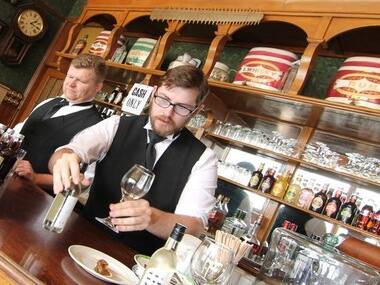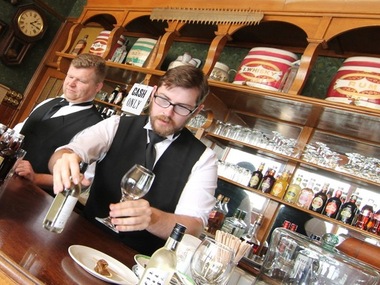SOUTH SHIELDS, ENGLAND: Three in four have shut in the last 40 years, but no one seems much bothered about Britain’s disappearing petrol stations. Pubs are closing at the rate of around 25 a week and it is as though the sky has fallen in.
 Conservationists fret about lost heritage. Lobbyists demand, and get, tax relief for the 45,000 that remain. Worried patrons have pooled their funds and saved 25 distressed “locals” by turning them into cooperatives. Public houses are struggling because of drink-driving laws, smoking bans, cheap booze at the supermarket and changing lifestyles. Beer sales are down by a quarter since 2010, wine sales up by a third. Shops have taken away sales, lifting their share of total alcohol shifted to over a half. “What’s killed the pub is the crap they put on TV,” said Steve Bannister, who with wife Beverley runs the Lamb Inn in the north of England village of Rainton. “People get a takeaway, a couple of cans, and stay in watching X Factor.” Is that a problem? some have asked. Petrol stations, an essential service, close. No one gets alarmed. Pubs, mostly a white male domain and often out of step with modern multicultural Britain, go out of business for everyday commercial reasons and yet people bleat about a great loss to the national fabric. David Brazier is regional representative for the North East for CAMRA, a volunteer lobby group that campaigns for pubs and for them to serve traditional ales as well as the global beer brands. “Pubs have to change,” he said. “They have to show they’re something that you can’t get anywhere else. The thing about real ales is: only in Britain and only in pubs.” Old pubs are changing. New ones are springing up with different offerings. Some focus on food, while others concentrate on what is behind the bar. Most now serve the sudsy stuff that is often brewed locally - something unavailable in shops. The Bannisters, in the forefront of the fightback, have turned one bar into a shop selling groceries and fresh produce. They regularly leaflet Rainton’s 150 houses with their special offers on food and drink. “People come into the pub trade thinking they’re going to buy a pub and retire. It’s the opposite. You work longer hours,” Bannister said. The Lamb offers accommodation in a campsite and keeps its shop open 15 hours a day. Kath Brain, who runs the dockside Steamboat in the north-east city of South Shields, reckons the worst of the spit-and-sawdust pubs have gone bust and the future belongs to well-managed real-ale taverns like her own. “We’re a proper local,” she said. “I pretty much know everyone in this pub by name. And they know a thing about me too. We look after each other.” The Steamboat does not serve food and awards dogs a warmer welcome than children. “I’m known as the poison dwarf - I don’t come to work to listen to bad language and I don’t allow bad behaviour,” she said. “We’ve single women who just walk their dogs and can come in and not worry.” At the other end of the spectrum is Wetherspoons, a thriving chain of 900 big pubs that answered the challenge to the traditional boozer with the cheapest beer in town - and, often, the cheapest breakfast as well. Wetherspoons, which earned a reputation as the place where youngsters get tanked up on Jager Bombs (spirits mixed with energy drinks) before a big night out, is now Britain’s fifth most popular place to have breakfast. Oxford University historian Mark Hailwood said pubs had always changed character to accord with changing social needs. “Diversifying their roles in some ways makes them more like early modern pubs - the pub as a place to eat was crucial in the early modern period, and at a time when there were few public buildings in villages it was a crucial hub of all sorts of communal activities such as sport, political discussion, courtship, even theatre, and of course music,” he said. “It’s something they’ve done in the past: adapted to the needs of customers.” Hailwood, author of a book on old ale houses, also sees a positive in the struggle for survival some pubs are engaged in: a change in gender roles and a new home-sweet-home ethos. “Fewer men now think it’s acceptable or desirable to go to the pub for hours after work every night, or at the weekend, whilst leaving their family at home: more men now like to take an active part in fatherhood and indeed in domesticity.” Bannister is less sanguine about the challenge from rising domesticity, gender politics and the lessons in lifestyle that Britons pick up while holidaying across the English Channel in Europe. “We’ve all gone Continental,” he said of the new style of British socializing. “They’ve got hot tubs and outside heaters and patios and barbecues. We’ll have people round for a bit of a barbecue, a bit of a singsong. It’s not that other pubs are taking the business. It’s the house party.” DPA Features
Conservationists fret about lost heritage. Lobbyists demand, and get, tax relief for the 45,000 that remain. Worried patrons have pooled their funds and saved 25 distressed “locals” by turning them into cooperatives. Public houses are struggling because of drink-driving laws, smoking bans, cheap booze at the supermarket and changing lifestyles. Beer sales are down by a quarter since 2010, wine sales up by a third. Shops have taken away sales, lifting their share of total alcohol shifted to over a half. “What’s killed the pub is the crap they put on TV,” said Steve Bannister, who with wife Beverley runs the Lamb Inn in the north of England village of Rainton. “People get a takeaway, a couple of cans, and stay in watching X Factor.” Is that a problem? some have asked. Petrol stations, an essential service, close. No one gets alarmed. Pubs, mostly a white male domain and often out of step with modern multicultural Britain, go out of business for everyday commercial reasons and yet people bleat about a great loss to the national fabric. David Brazier is regional representative for the North East for CAMRA, a volunteer lobby group that campaigns for pubs and for them to serve traditional ales as well as the global beer brands. “Pubs have to change,” he said. “They have to show they’re something that you can’t get anywhere else. The thing about real ales is: only in Britain and only in pubs.” Old pubs are changing. New ones are springing up with different offerings. Some focus on food, while others concentrate on what is behind the bar. Most now serve the sudsy stuff that is often brewed locally - something unavailable in shops. The Bannisters, in the forefront of the fightback, have turned one bar into a shop selling groceries and fresh produce. They regularly leaflet Rainton’s 150 houses with their special offers on food and drink. “People come into the pub trade thinking they’re going to buy a pub and retire. It’s the opposite. You work longer hours,” Bannister said. The Lamb offers accommodation in a campsite and keeps its shop open 15 hours a day. Kath Brain, who runs the dockside Steamboat in the north-east city of South Shields, reckons the worst of the spit-and-sawdust pubs have gone bust and the future belongs to well-managed real-ale taverns like her own. “We’re a proper local,” she said. “I pretty much know everyone in this pub by name. And they know a thing about me too. We look after each other.” The Steamboat does not serve food and awards dogs a warmer welcome than children. “I’m known as the poison dwarf - I don’t come to work to listen to bad language and I don’t allow bad behaviour,” she said. “We’ve single women who just walk their dogs and can come in and not worry.” At the other end of the spectrum is Wetherspoons, a thriving chain of 900 big pubs that answered the challenge to the traditional boozer with the cheapest beer in town - and, often, the cheapest breakfast as well. Wetherspoons, which earned a reputation as the place where youngsters get tanked up on Jager Bombs (spirits mixed with energy drinks) before a big night out, is now Britain’s fifth most popular place to have breakfast. Oxford University historian Mark Hailwood said pubs had always changed character to accord with changing social needs. “Diversifying their roles in some ways makes them more like early modern pubs - the pub as a place to eat was crucial in the early modern period, and at a time when there were few public buildings in villages it was a crucial hub of all sorts of communal activities such as sport, political discussion, courtship, even theatre, and of course music,” he said. “It’s something they’ve done in the past: adapted to the needs of customers.” Hailwood, author of a book on old ale houses, also sees a positive in the struggle for survival some pubs are engaged in: a change in gender roles and a new home-sweet-home ethos. “Fewer men now think it’s acceptable or desirable to go to the pub for hours after work every night, or at the weekend, whilst leaving their family at home: more men now like to take an active part in fatherhood and indeed in domesticity.” Bannister is less sanguine about the challenge from rising domesticity, gender politics and the lessons in lifestyle that Britons pick up while holidaying across the English Channel in Europe. “We’ve all gone Continental,” he said of the new style of British socializing. “They’ve got hot tubs and outside heaters and patios and barbecues. We’ll have people round for a bit of a barbecue, a bit of a singsong. It’s not that other pubs are taking the business. It’s the house party.” DPA Features
Pubs vanish as British men spend more time with their families
FP Archives
• November 12, 2015, 22:52:39 IST
Petrol stations, an essential service, close. No one gets alarmed. Pubs, mostly a white male domain and often out of step with modern multicultural Britain, go out of business for everyday commercial reasons and yet people bleat about a great loss to the national fabric.
Advertisement
)